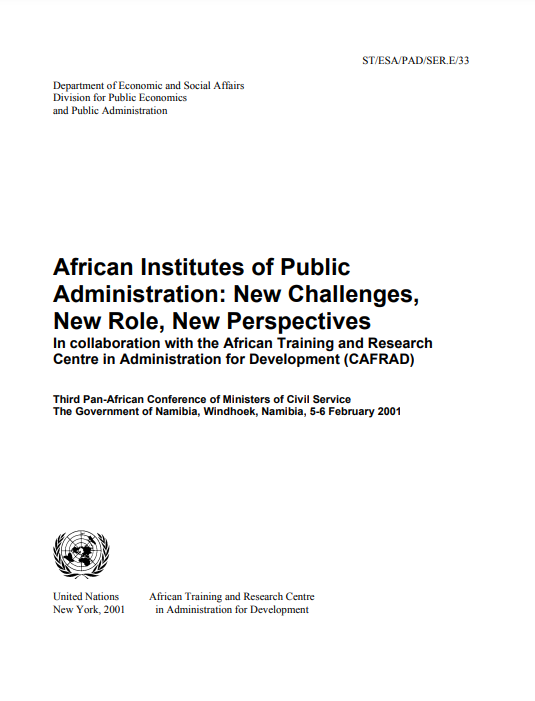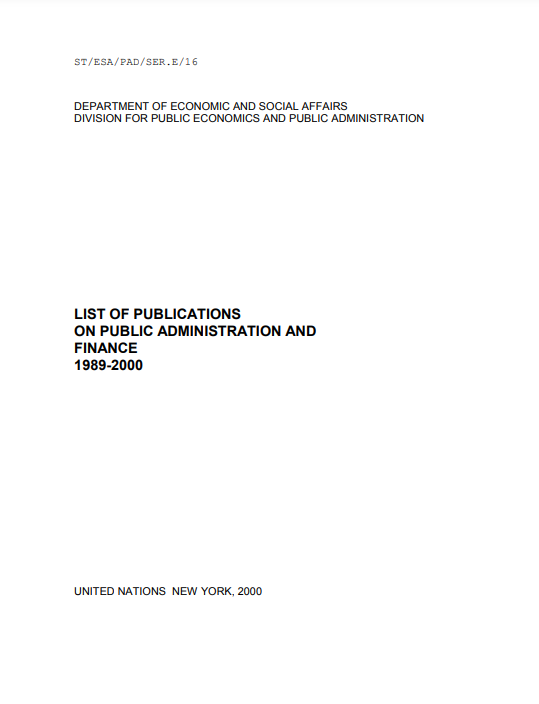| CEPA Strategy Guidance Notes | Principles of Effective Governance
CEPA strategy guidance note on strengthening of national statistical systems
The United Nations Committee of Experts on Public Administration (CEPA) has developed a set of principles of effective governance for sustainable development. The essential purpose of these voluntary principles is to provide interested countries…
| CEPA Strategy Guidance Notes | Sound Policymaking | Principles of Effective Governance
CEPA strategy guidance note on promotion of coherent policymaking
The United Nations Committee of Experts on Public Administration (CEPA) has developed a set of principles of effective governance for sustainable development. The essential purpose of these voluntary principles is to provide interested countries…
| CEPA Strategy Guidance Notes | Principles of Effective Governance
CEPA strategy guidance note on data sharing
Having access to reliable, accurate public-sector data is crucial for sound policymaking. Accurate data helps to answer fundamental questions on selecting proper actions, to realize intended outcomes and to achieve the overall effectiveness…
| CEPA Strategy Guidance Notes | Principles of Effective Governance
CEPA strategy guidance note on regulatory impact assessment
The United Nations Committee of Experts on Public Administration (CEPA) has developed a set of principles of effective governance for sustainable development. The essential purpose of these voluntary principles is to provide interested countries…
| CEPA Strategy Guidance Notes | Principles of Effective Governance
CEPA strategy guidance note on risk management frameworks
The United Nations Committee of Experts on Public Administration (CEPA) has developed a set of principles of effective governance for sustainable development. The essential purpose of these voluntary principles is to provide interested countries…
| CEPA Strategy Guidance Notes | Principles of Effective Governance
CEPA strategy guidance note on strategic planning and foresight
The United Nations Committee of Experts on Public Administration (CEPA) has developed a set of principles of effective governance for sustainable development. The essential purpose of these voluntary principles is to provide interested countries…
| CEPA Strategy Guidance Notes | Principles of Effective Governance
CEPA strategy guidance note on science-policy interface
The United Nations Committee of Experts on Public Administration (CEPA) has developed a set of principles of effective governance for sustainable development. The essential purpose of these voluntary principles is to provide interested countries…
| Publications
Publications in Public Administration and Development, 1992-2002
Publications in Public Administration and Development, 1992-2002
| Publications
Anti-Corruption Symposium 2001: The Role of On-line Procedures in Promoting Good Governance
Seoul, the capital of the Republic of Korea and nicknamed the “the Miracle of the Han River”, was one of the engines of rapid growth in one country among the “Asian Tigers”. As in many large cities, however, rapid economic growth was accompanied by…
| Publications
African Institutes of Public Administration: New Challenges, New Role, New Perspectives
The Third Pan-African Conference of Ministers of Civil Service, entitled “African Institutes of Public Administration: New Challenges, New Role, New Perspectives”, which took place in Windhoek, Namibia, on 5 and 6 February 2001, provided an…
| Publications
Publications in Public Administration and Development (1989-2000)
Publications in Public Administration and Development (1989-2000)
| Publications
Decentralization: Conditions for Success. Lessons from Central and Eastern Europe and the Commonwealth of Independent States
In April 1996, the United Nations General Assembly, at its resumed 50th session, adopted resolution 50/225 on Public Administration and Development. The resolution confirmed the importance of reinforcing public administration for development and…
 مرحباً بكم في الأمم المتحدة
مرحباً بكم في الأمم المتحدة 











